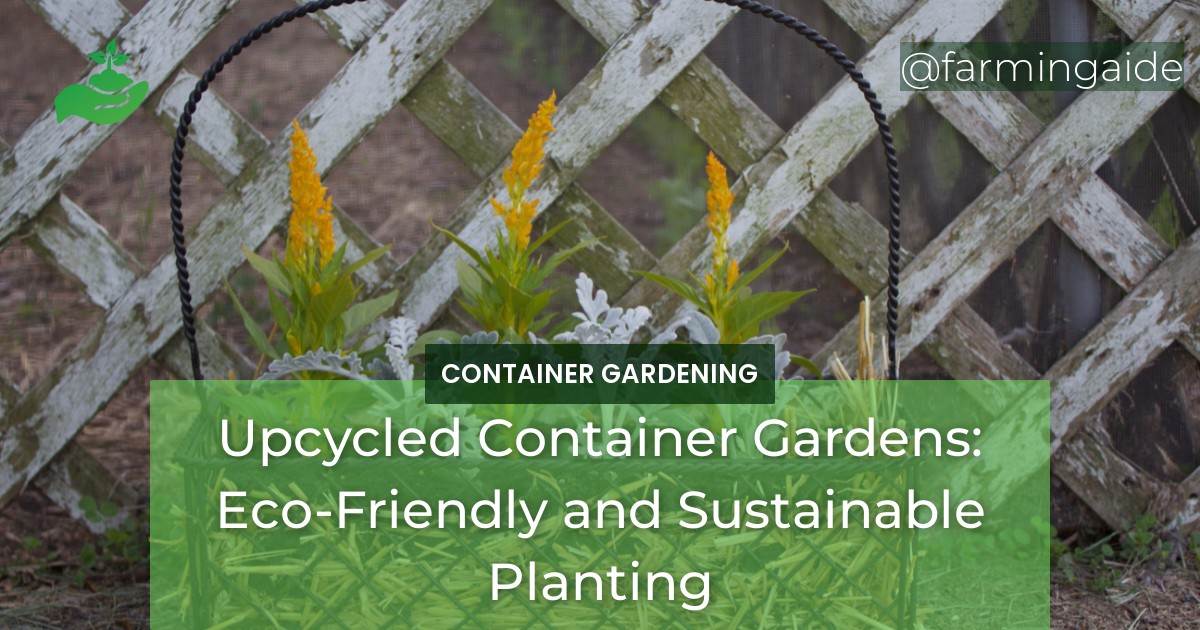Upcycling is becoming increasingly popular as people look for ways to reduce waste and promote sustainability. Container gardening is a perfect way to practice upcycling and growing plants in urban settings with limited space.
In this article, we will explore the benefits of upcycling in container gardening, ideas for upcycled container gardens, choosing the right plants for upcycled containers, sustainability, and upcycled container gardening, designing an upcycled container garden, and maintenance and care of upcycled container gardens.
Table of Contents
Benefits of Upcycling in Container Gardening
One of the most significant benefits of upcycling in container gardening is reducing waste. Instead of throwing away items, we can repurpose them as planters. Upcycling is also cost-effective and eco-friendly, allowing us to create unique and personalized containers without spending a lot of money. Furthermore, upcycling promotes creativity and innovation, encouraging us to think outside the box when it comes to gardening.
Ideas for Upcycled Container Gardens
- Using old tires and shoes as planters
- Repurposing old furniture into planters
- Creating planters out of household items like teapots and colanders
With a little creativity, almost anything can be turned into a planter. Upcycling provides an opportunity to turn trash into treasure and create unique and eye-catching gardens.
ALSO READ
Choosing the Right Plants for Upcycled Containers
When selecting plants for upcycled containers, it is essential to consider their growing conditions and how they will adapt to unconventional planters. Some plants are better suited to growing in confined spaces, while others require more soil and space to thrive. Succulents and herbs are great options for upcycled containers because they do not require a lot of soil or space. Additionally, it is essential to provide adequate drainage in upcycled containers to prevent root rot.
Sustainability and Upcycled Container Gardening
Upcycling is a sustainable and eco-friendly gardening practice that helps reduce waste and promote environmental consciousness. By using repurposed planters and other upcycled materials, we can reduce our carbon footprint while still enjoying the benefits of gardening. Additionally, upcycling promotes creativity and innovation, encouraging us to find new and unique ways to grow plants while minimizing our impact on the environment.
ALSO READ
Designing an Upcycled Container Garden
Designing an upcycled container garden involves considering color and texture to create a visually appealing garden. Using unique and unconventional planters can add interest and personality to a garden. Additionally, grouping plants with similar growing conditions can help create a cohesive and attractive garden. With upcycling, the possibilities for designing a one-of-a-kind garden are endless.
Maintenance and Care of Upcycled Container Gardens
Proper watering, fertilizing, and pruning are essential for maintaining upcycled container gardens. It is essential to monitor moisture levels in upcycled containers to ensure that plants are not overwatered or underwatered. Additionally, pests and diseases can be a problem for container gardens, so it is essential to practice good garden hygiene and take proactive measures to prevent infestations. Long-term maintenance strategies, such as regularly refreshing soil and fertilizing, can help promote sustainable and eco-friendly gardening practices.
Can Upcycled Container Gardens Help in Reducing Waste and Promoting Sustainability?
Upcycled container gardens with recycled materials can significantly contribute to waste reduction and sustainability efforts. By repurposing items like old buckets, cans, or bottles, these gardens minimize the need for new resources and divert waste from landfills. They also promote sustainable practices and showcase the potential of upcycling.
Conclusion
Upcycling is an excellent way to promote sustainability and reduce waste in gardening practices. Container gardening is a perfect opportunity to practice upcycling and grow plants in urban settings with limited space. By choosing the right plants, designing a visually appealing garden, and practicing good maintenance habits, upcycled container gardens can be a beautiful and sustainable addition to any home or garden.
RELATED ARTICLES:


